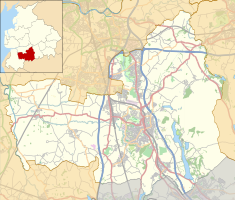Cuerden Hall
| Cuerden Hall | |
|---|---|

Cuerden Hall
|
|
| Location | Cuerden Valley Park near Preston, Lancashire, England |
| Coordinates | 53°42′36″N 2°39′44″W / 53.7100°N 2.6621°WCoordinates: 53°42′36″N 2°39′44″W / 53.7100°N 2.6621°W |
| OS grid reference | SD5639423929 |
|
Listed Building – Grade II*
|
|
| Designated | 21 February 1984 |
| Reference no. | 357614 |
Cuerden Hall is a country mansion in the village of Cuerden near Preston, Lancashire, England. It is a Grade II* listed building. The Hall was formerly a family home between 1717 and 1906, and used by the Army until the 1960s. It is now a Sue Ryder Care Home. The parkland and wider estate are known as Cuerden Valley Park.
The original house on the site, dating from the 17th century, no longer exists. The Charnock family of Charnock Richard, owned the estates until 1521, when Richard Charnock of Cuerden and Leyland sold his manor to Thomas Langton, Lord Newton. In 1605 Henry Banastre of Bank Hall bought the Cuerden Hall Estate from the Langton Family, (Barons of Newton-in-Makerfield) Henrys daughter Alice, wife of Sir Thomas Haggerston Bt, held ownership in 1641. The present building dates from 1717 and was erected by Banastre Parker, son of Robert Parker, the former High Sheriff of Lancashire for 1710, when he moved the Parker family from Extwistle Hall. Upon his death in 1738 the estate passed to his son Robert Parker (1727–1779) and in turn to his grandchildren Banastre Parker (1758–1788) and Thomas Towneley Parker (1760–1794).
In the years 1816 to 1819 Robert Townley Parker (1793–1879), having inherited the estate from his father, remodelled the Hall according to the designs of Lewis Wyatt. This incorporated a significant extension to the east wing of the property.
After the death of Capt. Robert Townley Parker (1823–1894) and later his brother Thomas Towneley Parker (1822–1906) the estate passed to their nephew Reginald Arthur Tatton (1857–1926) who re-designed the gardens, introducing a pergola and gazebo, a walled garden and pond.
During the First World War Tatton adapted the Hall for use as an infirmary for troops, and between 1 May 1915 and 8 June 1917 it was known as Cuerden Hall Auxiliary Hospital. The drawing rooms, with the Tatton family’s collection of old masters and portraits still adorning the walls, were turned into wards and furnished with beds, bed linen and equipment, whilst the parkland and gardens provided an area for convalescence for the soldiers, enjoying such activities as boating on the lake, haymaking, and picnicking. There were also trips to the Tatton family’s other house nearby, Astley Hall. An album filled with photographs, letters and news cuttings that tell this particular story in Cuerden Hall's history was recently offered for sale.
...
Wikipedia

